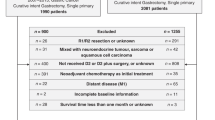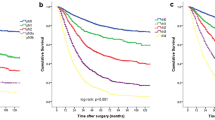Abstract
Background: In gastric cancer, the level and number of lymph node metastases is useful for predicting survival, and there are several staging systems for lymph node metastasis. The aim of this study was to compare the several lymph node classifications and to clarify the most important lymph node information associated with prognosis using multivariate analysis.
Methods: A total of 106 patients with histologically node-positive gastric cancer treated by radical gastrectomy and extended lymph node dissection (D2, D3) were studied. The level of lymph node metastasis was categorized simply as Level I nodes (perigastric, No.1–6), Level II nodes (intermediate, No.7–9), and Level III nodes (distant, No.10–16), irrespective of the tumor location. The Level II nodes included lymph nodes along the left gastric artery, common hepatic artery, and celiac trunk.
Results: Overall 5-year survival rate was 51%. Univariate analysis showed that 5-year survival rate was significantly influenced by the level of positive nodes (P < .01), total number of positive nodes (P < .01), number of positive Level I nodes (P < .01), and number of positive Level II nodes (P < .01), in addition to the tumor location (P < .05), tumor size (P < .05), gross type (P < .01), and depth of wall invasion (P < .01). Of these, independent prognostic factors associated with 5-year survival rate were the number of positive Level II nodes (0–1 vs. ≥2) (62% vs. 19%, P < .01) and the depth of wall invasion (within vs. beyond muscularis) (79% vs. 43%, P < .01).
Conclusions: Among several staging systems for lymph node metastases, the number of positive Level II nodes provided the most powerful prognostic information in patients with node-positive gastric cancer. When there were two or more metastases in the Level II nodes, prognosis was poor even after D2 or D3 gastrectomy.
Similar content being viewed by others
References
Bozzetti F, Bonfanti G, Morabito A, et al. A multifactorial approach for the prognosis of patients with carcinoma of the stomach after curative resection. Surg Gynecol Obstet 1986;162:229–234.
Maruyama K. The most important prognostic factors for gastric cancer patients: a study using univariate and multivariate analyses. Scand J Gastroenterol Suppl 1987;22:63–68.
Okusa T, Nakane Y, Boku T, et al. Quantitative analysis of nodal involvement with respect to survival rate after curative gastrectomy for carcinoma. Surg Gynecol Obstet 1990;170:488–494.
Makino M, Moriwaki S, Yonekawa M, Oota M, Kimura O, Kaibara N. Prognostic significance of the number of metastatic lymph nodes in patients with gastric cancer. J Surg Oncol 1991;47:12–16.
Yu W, Choi GS, Whang I, Suh IS. Comparison of five systems for staging lymph node metastasis in gastric cancer. Br J Surg 1997;84:1305–1309.
Japanese Gastric Cancer Association. Japanese classification for Gastric Cancer: 2nd English edition. Gastric Cancer 1998;1:10–24.
Adachi Y, Oshiro T, Okuyama T, et al. A simple classification of lymph node level in gastric carcinoma. Am J Surg 1995;169:382–385.
Jaehne J, Meyer HJ, Maschek H, Geerlings H, Bruns E, Pichlmayr R. Lymphadenectomy in gastric carcinoma: a prospective and prognostic study. Arch Surg 1992;127:290–294.
Adachi Y, Kamakura T, Mori M, Baba H, Maehara Y, Sugimachi K. Prognostic significance of the number of positive lymph nodes in gastric carcinoma. Br J Surg 1994;81:414–416.
Roder JD, Böttcher K, Busch R, Wittekind C, Hermanek P, Siewert J. Classification of regional lymph node metastasis from gastric Cancer. Cancer 1998;82:621–631.
Fujii K, Isozaki K, Okajima K, et al. Clinical evaluation of lymph node metastasis in gastric cancer defined by the fifth edition of the TNM classification in comparison with the Japanese system. Br J Surg 1999;86:685–689.
Hayashi H, Ochiai T, Suzuki T, et al. Superiority of a new UICC-TNM staging system for gastric carcinoma. Surgery 2000;127:129–135.
Adachi Y, Suematsu T, Shiraishi N, Tanimura H, Morimoto A, Kitano S. Perigastric lymph node status as a prognostic indicator in patients with gastric cancer. Br J Surg 1998;85:1281–1284.
Wu CW, Hsieh MC, Lo SS, Tsay SH, Lui WY, P’eng FK. Relation of number of positive lymph nodes to the prognosis of patients with primary gastric adenocarcinoma. Gut 1996;38:525–527.
Noguchi Y, Imada T, Matsumoto A, Coit DG, Brennan MF. Radical surgery for gastric Cancer: a review of the Japanese experience. Cancer 1989;64:2053–2062.
Gunven P, Paruyama K, Okabayashi K, Sasako M, Kinoshita T. Non-ominous micrometastases of gastric cancer. Br J Surg 1991;78:352–354.
Wagner PK, Ramaswamy A, Rüschoff J, Schmitz-Moormann P, Rothmund M. Lymph node count in the upper abdomen: anatomical basis for lymphadenectomy in gastric cancer. Br J Surg 1991;78:825–827.
Smith JW, Shiu MH, Kelsey L, Brennan MF. Morbidity of radical lymphadenectomy in the curative resection of gastric carcinoma. Arch Surg 1991;126:1469–1473.
Roukos DH, Lorenz M, Encke A. Evidence of survival benefit of extended (D2) lymphadenectomy in Western patients with gastric cancer based on a new concept: a prospective long-term follow-up study. Surgery 1998;123:573–578.
Adachi Y, Kamakura T, Mori M, Maehara Y, Sugimachi K. Role of lymph node dissection and splenectomy in node-positive gastric carcinoma. Surgery 1994;116:837–841.
Wanebo HJ, Kennedy BJ, Winchester DP, Fremgen A, Stewart AK. Gastric carcinoma: does lymph node dissection alter survival? J Am Coll Surg 1996;183:616–624.
Bonenkamp JJ, Songun I, Hermans J, et al. Randomised comparison of morbidity after D1 and D2 dissection for gastric cancer in 996 Dutch patients. Lancet 1995;345:745–748.
Cuschieri A, Fayers P, Fielding J, et al. Postoperative morbidity and mortality after D1 and D2 resections for gastric cancer: preliminary results of the MRC randomised controlled surgical trial. Lancet 1996;347:995–999.
Bonenkamp JJ, Hermans J, Sasako M, van de Velde CJH. Extended lymph-node dissection for gastric cancer. N Engl J Med 1999;340:908–914.
Adachi Y, Mimori K, Mori M, Maehara Y, Sugimachi K. Morbidity after D2 and D3 gastrectomy for node-positive gastric carcinoma. J Am Coll Surg 1997;184:240–244.
Otsuji E, Yamaguchi T, Sawai K, Ohara M, Takahashi T. End results of simultaneous splenectomy in patients undergoing total gastrectomy for gastric carcinoma. Surgery 1996;120:40–44.
Bozzetti F, Marubini E, Bonfanti G, et al. Total versus subtotal gastrectomy: surgical morbidity and mortality rates in a multicenter Italian randomized trial. Ann Surg 1997;226:613–620.
Author information
Authors and Affiliations
Rights and permissions
About this article
Cite this article
Adachi, Y., Shiraishi, N., Suematsu, T. et al. Most Important Lymph Node Information in Gastric Cancer: Multivariate Prognostic Study. Ann Surg Oncol 7, 503–507 (2000). https://doi.org/10.1007/s10434-000-0503-1
Received:
Accepted:
Issue Date:
DOI: https://doi.org/10.1007/s10434-000-0503-1




